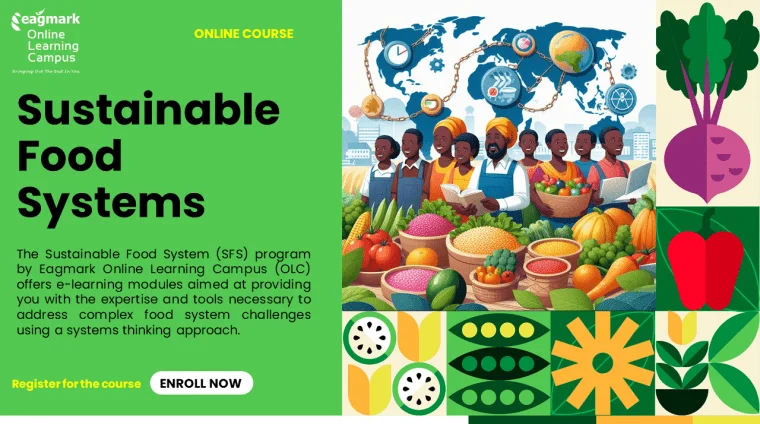Sustainable Food Systems
This comprehensive online, self-paced course provides participants with the expertise and tools necessary to address complex food system challenges using systems thinking. The Sustainable Food Systems program empowers learners to shape resilient food systems capable of providing equitable nourishment to a growing global population, even under challenging conditions.
Course Overview
Through seven interconnected modules, participants explore the necessary transformations at micro-, meso-, and macro-levels to revolutionize food production, processing, and consumption. The course combines theoretical frameworks with practical applications, culminating in the development of personalized Action Plans to spearhead sustainability initiatives within participants' own organizations or sectors.
🎯 Course Objectives
Upon completion of this course, participants will be able to:
Apply systems thinking approaches to analyze and address complex food system challenges, understanding interconnections between production, processing, distribution, and consumption components
Design sustainable food system solutions that balance nutritional needs, environmental conservation, economic viability, and social equity across different scales and contexts
Evaluate and implement inclusive business models in agriculture that promote economic growth, reduce poverty, and enhance food security while maintaining environmental sustainability
Develop strategies for reducing food loss and waste throughout the supply chain using circular economy principles and the food recovery hierarchy framework
Assess environmental impacts of food systems including biodiversity conservation, water and land management, and carbon footprint reduction while promoting healthy sustainable diets
Create actionable transformation plans for implementing sustainable food system practices within their organizations, communities, or policy frameworks using evidence-based decision-making approaches
Key Features
Requirements
- Reliable internet connection for accessing online content, videos, and interactive sessions
- Computer, tablet, or smartphone capable of running modern web browsers and supporting video content
- Basic digital literacy including ability to navigate online learning platforms, participate in discussion forums, and download/upload assignments
- Interest in food sustainability and systems transformation (no specific prior expertise required)
- High school level education or equivalent with basic understanding of economic, environmental, and social concepts
- Background or interest in sustainable agriculture, economics, environmental science, or related fields (preferred but not mandatory)
- English proficiency sufficient for academic reading, writing, and online discussion participation
- Program designed for completion in 8 weeks with flexible, self-paced scheduling
- Approximately 6-10 hours of commitment per week including content review and forum participation
Target Audience
- Agricultural Professionals including farmers, agricultural consultants, extension officers, and cooperative managers seeking to implement sustainable practices and business models
- Food Industry Professionals in manufacturing, processing, retail, wholesale, and service sectors looking to integrate sustainability into their operations and supply chains
- Supply Chain and Procurement Specialists responsible for sourcing, logistics, and vendor management in food-related organizations seeking sustainable sourcing strategies
- Policy Makers and Government Officials involved in food policy development, agricultural policy, and sustainable development planning at local, national, and international levels
- Development Practitioners and NGO Professionals working on food security, rural development, and sustainability projects in various geographic contexts
- Entrepreneurs and Business Leaders developing innovative solutions for food system challenges, including food tech startups, social enterprises, and impact investors
- Consultants and Analysts in sustainability, agriculture, food systems, and related fields providing advisory services to organizations and governments
- Academic Researchers and Students in agriculture, environmental science, nutrition, economics, and related fields conducting research or seeking practical application of theoretical knowledge
- Marketing and Communications Professionals in food, agriculture, and sustainability sectors developing strategies for promoting sustainable food systems
- Finance and Investment Professionals working with agricultural investments, sustainable finance, and impact investing in food system transformation
- Developing Country Practitioners focusing on food security, smallholder farmer support, and inclusive business model development
- Developed Country Professionals working on advanced sustainability challenges, consumer behavior change, and policy innovation
- International Development Workers implementing programs across multiple countries and contexts
- Urban and Rural Stakeholders with content applicable to both urban food systems and rural agricultural contexts
- Entry Level Professionals new to food systems work seeking comprehensive foundational knowledge
- Mid-Career Professionals looking to expand their expertise and integrate sustainability principles into their current roles
- Career Changers transitioning into food systems, sustainability, or agriculture-related fields from other sectors

Course Type: Self-Paced
Language: English
Duration: 4 weeks
42 students enrolled
20 lessons
2 quizzes
Assessment: Based on Completed Lessons
Intermediate skill level
Course Instructor
Eagmark OLC
Instructor
Course Certificate
A certificate of completion is available for this course.